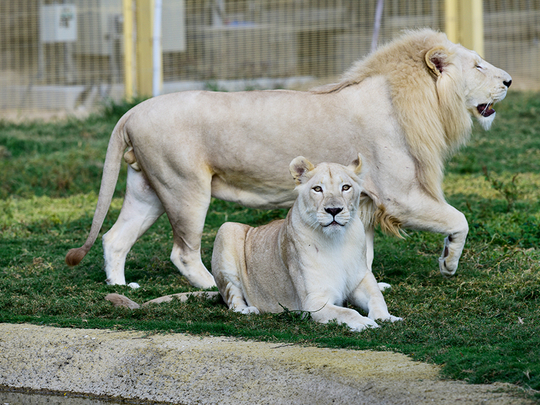
Dubai: The Safari Park shuttered its gates early on Monday after an unexpected rush of visitors.
On its Twitter account, Dubai Safari said: “We've had an unprecedented number of visitors today and have reached our capacity. We appreciate your understanding and look forward to seeing you tomorrow.”
We've had an unprecedented number of visitors today and have reached our capacity. We appreciate your understanding and look forward to seeing you tomorrow#DubaiSafariPark #DubaiSafari #Dubai #UAE #SoftOpening #سفاري_دبي #دبي #الإمارات #حديقة_سفاري_دبي pic.twitter.com/6H5RgAs8vm
— Dubai Safari (@DubaiSafariAE) December 18, 2017
Dubai Municipality announced the temporary closure of Dubai Safari on Sunday after heavy rain lashed out across the emirate, leading to massive traffic jams and waterlogged roads in many of Dubai’s popular routes.
Although Dubai did not witness any rain or thunder on Monday, organisers assured that the park’s closure was taken after the park reached its maximum capacity earlier than expected.
For the next two weeks, Dubai Safari is open until 5pm.
نظراً للإقبال الشديد .. و بناءً على طلب الجمهور فقد تم تخصيص يومي الاثنين ١٨ ديسمبر والاربعاء ٢٠ ديسمبر للعائلات فقط
— Dubai Safari (@DubaiSafariAE) December 16, 2017
Due to popular demand we are happy to announce that Monday 18th of December & Wednesday 20th of December are for families only. pic.twitter.com/t090x2BLc6
Three days were also dedicated to families, while residents can continue to visit the Dh1 billion wildlife project for free until December 26.
In the first two days alone, the wildlife park received over 14,000 visitors who rushed to take advantage of the limited period offer of free entry.
After the official opening in January, standard ticket rates ranging from Dh20 to Dh30 for children and Dh50 to Dh85 for adults will be applicable.
Migratory birds and butterflies
Dubai Safari, which opened its doors to the public last week, is not only home to the wildlife of the world for conservation breeding, but it has also become a hub for receiving migratory birds and some local UAE birds.
The conservation team at Dubai Safari has already recorded nearly 80 species of birds, 70 percent of which are migratory and the rest native, either breeding within the Safari grounds or its surrounding areas.
A male Purple Sunbird drinking nectar from a tree in Dubai Safari.
Most recent arrivals are four sub-adult Greater Flamingoes, which have migrated to the UAE with a small population, breeding on islands in Abu Dhabi. The migratory birds come from northern Iran and parts of Central Asia.
The safari conservation team, headed by Dr Reza Khan, Principal Wildlife Specialist at Dubai Safari, is responsible for recording the plants that are growing naturally in the safari and whether the animals visiting the safari are in transit or becoming permanent residents.
An Indian Roller migratory bird already started breeding inside the safari.
"A recording of some 80 species of birds and nearly 35 species of plants from the safari are proving that Dubai Safari is the future for many new bird species getting their suitable transit homes for the migratory species and permanent homes for the local ones," said Dr Khan.
"Dubai Safari is paying a kind of dividend to the Emirati people by becoming an attractive site for birds and other animals as well as some local and exotic plants," he added.
A Blue Pansy butterfly.








